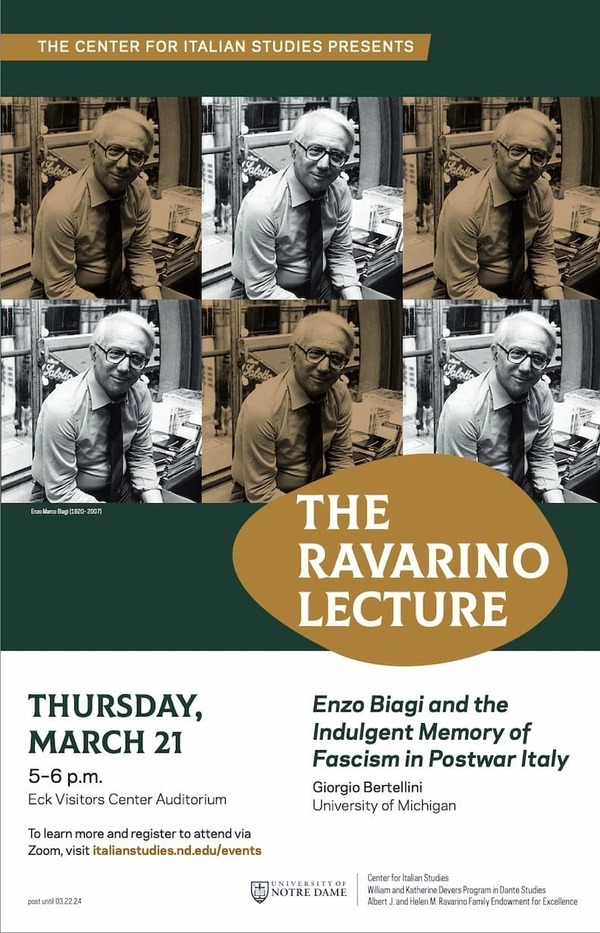Ravarino Lecture: "Enzo Biagi and the Indulgent Memory of Fascism in Postwar Italy" by Giorgio Bertellini (University of Michigan)

The Spring lectures are being planned in a hybrid online and in-person format. Please register here.
The Center for Italian Studies is proud to present the seventh annual Ravarino Lecture on March 21, 2024. This year's lecture will be delivered by Giorgio Bertellini of the University of Michigan:
Enzo Biagi and the Indulgent Memory of Fascism in Postwar Italy
The post-1990s public de-mystification of the long celebrated Italian armed resistance against Fascism and Nazism (1943-1945), resulting from the decades-long efforts by a few journalists of either obvious or latent “anti-anti-Fascist” leaning, has appeared to many professional historians as a politically motivated assault against the antifascist foundations of the Italian Republic. Over the years, this accusation claimed, a conspiracy of popular journalists and bestselling authors Indro Montanelli, Giorgio Pisanò, and Arrigo Petacco, among others, produced an indulgent domestication of the memory of Fascism that distracted Italians from the regime’s violent, undemocratic nature.
In this talk I explore a complementary explanation by focusing less on those writers’ political motivations and more on the appealing formats of Italy’s postwar cultural industry that authors and journalists of a wider political spectrum were also adopting.
To articulate this hypothesis, I focus on the least likely case study: the career of Enzo Biagi (1920-2007), a former member of the Resistance, and one of Italy’s first “total journalists.” A reporter since the late 1930s, after the war Biagi edited a most popular periodical (Epoca) directed a daily newspaper (Il Resto del Carlino), curated richly illustrated authoritative encyclopedias about Fascism and World War II, sold weekly at newsstands, before devoting his time to anchoring news television programs and writing yearly bestsellers.
Over the years Biagi maintained an impeccable reputation as truth-telling reporter and principled commentator — a do-gooder, in fact — on world affairs, but especially on 20th century Italian history. Professional historians largely ignored his work even though in most of his roles, I argue, he engaged in a much copied form of entertaining journalism that dealt with Fascism (and history in general) with an influential degree indulgence. A historical witness, he positioned himself as vicarious participant who had chosen to be on the right part of History but who did not linger in moral condemnation. Instead, he reported on the private life, psychology, and the contingent actions of notable figures of the regime and, sometimes, of the Resistenza — whether through biographical profiles or the interview format — and made them relatable. He therefore contributed to reducing World War II, the colonial campaigns and the civil war from historical phenomena impacting millions of lives to a series of sketches and anecdotes featuring colorful, and rarely consequential characters. Fascism emerged as a clumsy and humane regime that was incomparably different from Nazism, as the apologists of Mussolini were also contending. Furthermore, Biagi’s publications and television programs’ extensive use of photographs and film footage of the Istituto Luce — rarely discussed as one-sided source — served as a visible correlative to this forgiving version of the past and gave the impression that nothing more needed to be shown and revealed.
The event is free and open to all. If you prefer to join on Zoom, please register in advance. Once registered, you will receive an email containing the Zoom link.
Each year, thanks to the Albert J. and Helen M. Ravarino Family Endowment for Excellence, the Center for Italian Studies sponsors a public lecture by a distinguished scholar of Italian Studies.
Originally published at italianstudies.nd.edu. Please check their website for the most up-to-date information about this event.